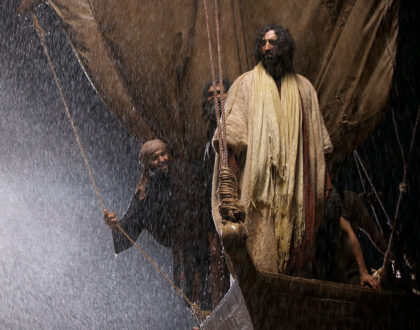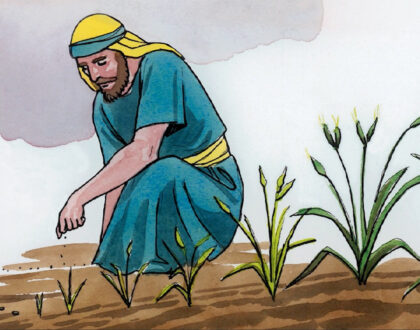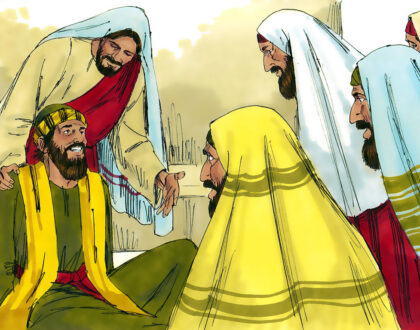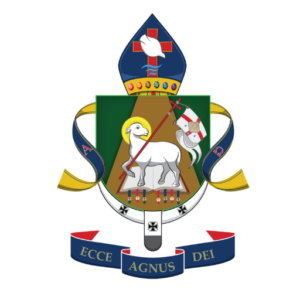Christ is the Only Door

“Christ is the Only Door”
Archbishop Loren Thomas Hines
Third Sunday After Easter
May 7, 2017
Readings: Acts 6:1-9; 7:2a, 51-60; Psalm 23
1 Peter 2:19-25
John 10:1-10
The events of Easter are the most important events in the life of Christ that give us new life. He took us out of the darkness of slavery and gave us a new life of freedom and much hope. He shares this to us in today’s lessons to show us and help us understand the necessity of order in our lives. Many people don’t know order; they just do whatever they want, and this causes confusion, much sorrow and death. All you have to do is drive in one of our streets to see that we don’t understand order. We all want to be no. 1 – very egotistical and unconcerned about anyone else but “me”. Order is not taught by government, not even in many of our schools. When I was in school a long time ago, we were taught to walk and bike on one side of the road. We were taught all the safety factors. Nowadays, we hardly find institutions that teach us how to live life in an orderly manner.
Today’s lessons tell us about order. Our first reading in Acts was one of my major homilies when I first came to work for missions. I was not a preacher nor a pastor or minister; I was a businessman called to missions by God. The people couldn’t understand what a businessman would be doing on mission works. This was the sermon I chose because it talks about how lay people have a ministry to make the Church function properly. Lay people take the pressure off of the pastor or priest so he can focus on discerning the direction of God, instead of worrying about other things like feeding widows, as in the case in our reading from Acts. When I went to my first assignment, I was doing fine till I began to do ministry where the membership soon grew to a thousand. The other missionaries didn’t like this and asked me to leave. So I came here (to the Philippines) to do the same mission work. When God calls us for service, it’s important that we do it well and properly. We talk about the greatness of God, and not about us. It’s never about us. If we truly know God, we have the confidence that He will take care of us.
It’s very important for us to understand the Gospel and what it teaches us about order. This is a principle of life itself. The event in the Gospel happened during a feast in Jerusalem. According to Jewish tradition, God called the men to go to Jerusalem three times a year to celebrate feasts. In each of these feasts, God asked them not to go empty-handed because He has blessed His people and He wanted them to put these blessings as priority in their lives. So they came to Jerusalem with a blessing for the temple. The event in the Gospel took place at the conclusion of the Feast of Tabernacles, an 8-day event that came at the end of harvest time. They came to Jerusalem to thank and worship God for the blessing and to help them remember where they came from. They were in the wilderness for 40 years, living in tents, eating manna and being provided by God with everything they needed; even their shoes didn’t wear off! The feast was instituted to help them remember all this so that they would always know how they made it to the Promised Land and be thankful to God. They came to Jerusalem for the feast and lived in square buildings to help them remember what it was like in the wilderness. There were basically 3 feasts that they went to Jerusalem for: 1) Feast of Tabernacles; 2) Passover; and 3) Pentecost.
Near the final day of this event, after Jesus had taught in the temple, He healed the man who was blind from birth. People asked Him whose fault it was that this man was born blind, and Jesus said it wasn’t anybody’s fault but he was born blind for the glory of God. Jesus healed the blind man, and this caused a lot of confusion because 1) he was healed on a Sabbath, a day when no healing was allowed; and 2) the man didn’t know who healed him. He didn’t know Jesus, so he couldn’t say who healed him when the Pharisees asked him. His parents couldn’t talk either because if they did, they could be removed from the synagogue. The Pharisees wanted to know if the man was sure that the One who healed him was a good man. The man replied that it has never been heard that anyone opened the eyes of a person born blind and if the man who healed him were not from God, He could do nothing. The Pharisees were offended; so they went to Jesus and had a dialogue with Him, and the result of that dialogue is what we read in John 10. The Pharisees heard Jesus saying to the man healed of blindness, “For judgment I came to the world, so that those who do not see may see, and those who see may become blind”. So they asked Jesus, “We are not blind too, are we?” Jesus replied, “If you were blind, you would have no sin; but since you say, ‘We see”, your sin remains”. Jesus was confronting the Pharisees because they were the religious and they were supposed to know the principles of God, but instead of following these principles, they were doing their own thing, bringing people into bondage and slavery to themselves. They took the Ten Commandments and expanded them to over 600 laws, making it burdensome for the people who were constantly in fear of breaking them.
When the Pharisees asked Jesus if they were blind also, He brought out this principle of order for us to understand. He said, “Truly, truly I say to you, he who does not enter by the door into the fold of the sheep, but climbs up some other way, he is a thief and a robber”. In saying this, Jesus was referring to leadership. He was telling the Pharisees that they didn’t come to the Kingdom through the door, but set their own course and direction, causing people to follow what they, the Pharisees want, rather than the principles of God. When Jesus said, “He who enters by the door is a shepherd of the sheep”, He was also telling us that He came “legally”, in the flesh, through the door of the flesh. He didn’t just appear; He was born as human, and so He came into the world “legally”, and He had a right to be here. He made this clear to the Pharisees because He wanted them to know that He had the authority to do what He was doing – the miracles, the healings, the preaching – and they shouldn’t be questioning Him. Instead, they should be looking at their own lives and realize that they are not being what God intended them to be.
On the last day of the feast, the people would take water from the pool of Siloam, mix it with wine and then pour the mixture at the foot of the altar. This was done in memory of what happened to them in the wilderness when they had no water and Moses struck the rock and water poured forth. They did this to remind themselves of the favor of God upon them as a people; how God brought them out of the wilderness to a land flowing with milk and honey. Since then they had been prospering. God wanted them to be thankful, remembering what He had done for them and this is why He set this order for them to follow. Much like the Eucharist where we are constantly reminded what Christ has done for us and not lose its value. Sadly, sometimes we just see it as a ceremony and we forget its meaning.
In John 10, Jesus is setting the course and order of life. He says if you are to be a shepherd, then you must come in through the door of the sheepfold. Jesus is the door. If Jesus isn’t the center of your life, if what He has done for His people doesn’t change your life and you don’t lead the way by imparting this to the flock, then you’re not a shepherd. Jesus confronted the Pharisees that they may realize who He was and the fact that He came because the Church wasn’t being what it’s supposed to be; because the Church was leading people into slavery instead of setting them free. Christ did not come to judge but to forgive. God loves the world so much, He sent His Son to deliver us from the bondage of death into new life (John 3:16). This is why the celebration of Easter is one of the high points of the Church; it reminds us that God has taken us out of bondage and gave us new life.
They bring water from Siloam, mix it with wine and pour it on the altar. Siloam means “sent”. Christ was sent. The people were declaring this without realizing it; they didn’t fully understand the meaning of the ceremony. Everything that God does has a purpose, and in pouring the water they were bringing Christ to the altar, even if He hadn’t gone to the cross yet. This was the last feast before the crucifixion. Jesus didn’t celebrate the next feast, the Passover, because He was the Lamb slain on that feast. So we see the chain of events taking place and their meaning. The Jews still celebrate these feasts, perhaps under different names because God instructed them to do so. As born again Christians, we don’t have traditions or patterns that we follow religiously; we do whatever we want. Many churches don’t train people to understand what God has given them. Jesus said, “For judgment I came into this world, so that those who do not see may see, and those who see may become blind” (John 9:39). Religious leaders have all their schemes and plans that they ask people to follow, believing that if they do, they will be okay; but do they really know Jesus? Christ is the only door to the Kingdom. A church may have programs and ceremonies, but if they are based on knowledge alone and not on knowing Christ, they won’t work. Christ is the center of our salvation.
Jesus was effectively telling the Pharisees that they were the blind leading the blind. They were not good shepherds, and they were opening the door for the “wolf” to come in. We see this happening today in some churches where the ministry is to make people feel good without teaching them their responsibility towards Christ. These leaders are leading people astray. The Pharisees were bringing people under control through deception. I remember how we used to have a machine at the Cathedral where people punched in their attendance. That was putting people in bondage. Some churches check their members’ tax returns to find out if they are paying the correct tithes. Some won’t allow you to take the Eucharist if you violate their rules. The Church shouldn’t be doing these things. It represents Christ and therefore it should bring hope, salvation, redemption and restoration to all mankind; not through rules and regulations, but through the principles of Christ’s life. We’re all at different stages of development. We’re all going through a journey; some have just started, others are in the middle of it, while some are way ahead. Jesus was 30 years old when He began His ministry. He took 30 years to prepare for it. This tells us how important preparation and order are in our lives. We don’t prepare enough; we have the attitude that what will be, will be. “Bahala na!” We don’t realize that how we live our lives will have consequences. They aren’t accidents; they are results of our actions.
Christ came to give His life. At the cross, He said, “Father, forgive them for they know not what they do”. Stephen, a deacon in today’s church leadership, said the same thing as the people stoned him to death. This should be the order of the Church’s leadership – leading the people to forgive, not to condemn; not to destroy but to restore. Christ is the door. He must be no. 1, not music and not teaching in the church. Christ must be the center; our focus is on Him, to thank Him for what He has done for us. This is what the Feast of Tabernacles is about – to make the people remember where they had been and what God had done for them so they could thank Him. This is what Easter is about – the love of a Shepherd who does not look at our sins and the wrongs we have done, but redeems us and restores us to the Kingdom of God. Remember when Jesus appeared to His disciples after His resurrection, the first thing He said was “Peace!” He didn’t care about the wrong they had done because He only wanted to restore them to the place where God can use them for His glory. Some of the greatest ministers of the church were restored from great failures, like Bishop Constantino who used to be in the Mafia but later on built a ministry to restore prisoners in many places. Through his ministry, many prisoners were restored back to becoming useful members of society. He understood their needs because he used to be one of them. You can’t have victory if you don’t have anything to conquer. You won’t know freedom until you know what slavery is. Look at Paul; he used to be Saul, persecuting the church, going after the believers so he could bring them to Jerusalem to be punished. Yet God chose Him for a special ministry and he became the greatest apostle in the New Testament.
This is Easter; it gave us new life. The old things have passed away – the sin and the darkness – Christ took them all away. All things are new. Many times we think that we can never amount to anything, but God doesn’t see us that way. He will make our rough edges beautiful, like a diamond dug from the ground that has to go through a process before its beauty is revealed. We, too, are going through a process. Some shepherds steal and manipulate. In Jewish tradition, when a widow dies, the church takes her properties, and these were among the things that Jesus was fighting against. There were many things that were wrong and Christ came to set things right in the world and the Church. It’s now our responsibility to do the same. We must work with Him to remove the divisions in the Church where everybody should be equal – no rich or poor, no good or bad. Everybody is God’s people and we must treat each one that way. We want to be good shepherds; we’re all responsible for certain areas of life as shepherds, leading others to Christ. Jesus is the door. There’s no other way to God. It’s not our financial contributions or our strict adherence to the laws that matter. What matters is our relationship with Christ.
A shepherd leads the flock; it’s not the flock who should lead the shepherd. A shepherd must live a life that’s worthy of being emulated by the flock. This life should be centered on Christ. This is important because in the world today, many think they know everything so they do as they see fit. It’s Christ we should follow. If we know Him, we also know His voice. If you don’t hear His voice, something’s very wrong. We have hope; Christ is our good Shepherd. We don’t need to worry because He will take care of us. He doesn’t destroy; He builds. He doesn’t condemn; He restores. We should know Him so well that we choose the right path so that the blessings of God would be upon us. I was a businessman but I ended up in church because it was in my heart. I remember that time when we were having a seminar in Jakarta and we had to get government approval for the seminar. We didn’t get the approval so the government sent people to arrest us, but when they heard what we were teaching, they realized that it was good so they didn’t make any arrest. This was God’s grace. When we follow the plan of God, even if others are against us, they can’t bring us down because of God’s grace. He does not forsake us because He loves us. This is Easter – new life. See Christ as the good Shepherd.
Recent Sermons

Jesus, Calmer Of Storms
June 23, 2024

Harvest Time Stemming From The Smallest Seed
June 17, 2024

Not Bound By Limitations To Minister
June 10, 2024

